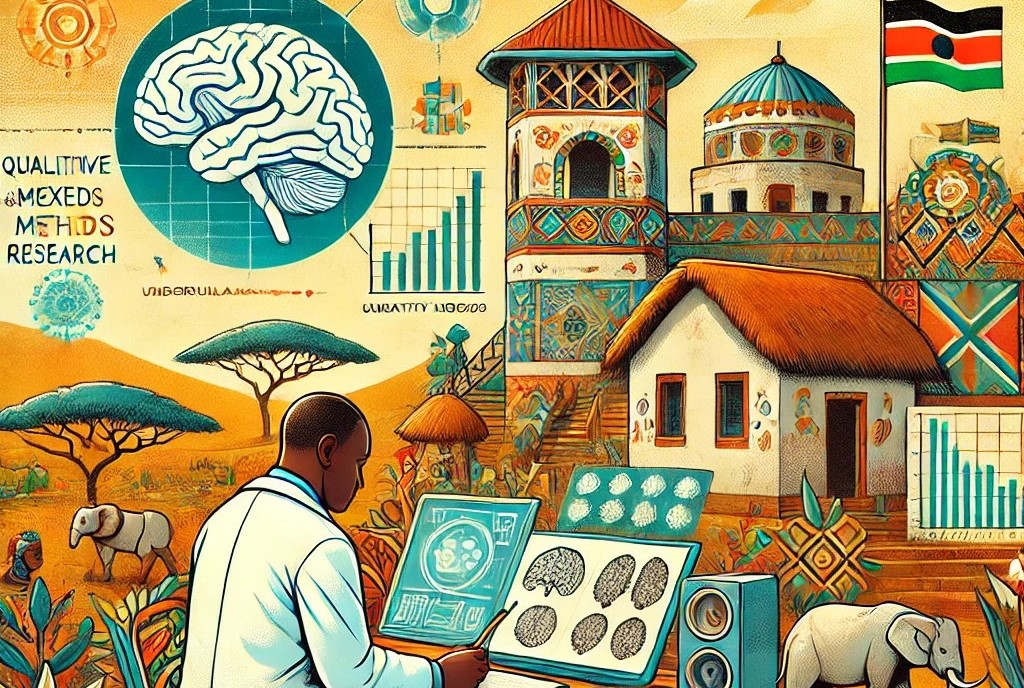Qualitative And Mixed Methods Research: Underutilized Tools in Neuroscience Research Within the East African Context
Schlagworte:
Qualitative, Quantitative, Mixed Methods, Neuroscience, East AfricaAbstract
Neuroscience, the intricate study of the nervous system, has traditionally relied heavily on quantitative research methods to decode the complexities of brain function, neural activity, and cognitive processes. However, the growing recognition of the limitations of purely quantitative approaches has led to an increasing appreciation for qualitative and mixed methods research globally (1). These approaches offer a richer, more nuanced understanding of the human brain, particularly when it comes to the investigation of experiences, behaviour, and societal impact. In the East African context, where cultural, social, and economic factors significantly influence health and disease, the application of these methodologies is particularly pertinent. This editorial article looks into the potential applications of qualitative and mixed methods research in neuroscience in East Africa, exploring how these methodologies can enrich our understanding of neuroscience.
Literaturhinweise
Das MK. An Introduction to Qualitative and Mixed Methods Study Designs in Health Research. Indian Pediatr. 2022 May 15;59(5):416–23.
Pyo J, Lee W, Choi EY, Jang SG, Ock M. Qualitative Research in Healthcare: Necessity and Characteristics. J Prev Med Pub Health. 2023 Jan;56(1):12–20.
Hartley S, McArthur M, Coenen M, Cabello M, Covelli V, Roszczynska-Michta J, et al. Narratives Reflecting the Lived Experiences of People with Brain Disorders: Common Psychosocial Difficulties and Determinants. PLoS ONE. 2014 May 7;9(5):e96890.
Whiffin CJ, Smith BG, Selveindran SM, Bashford T, Esene IN, Mee H, et al. The Value and Potential of Qualitative Research Methods in Neurosurgery. World Neurosurg. 2022 May;161:441–9.
Staton A, Dawson D, Merdian H, Tickle A, Walker T. Functional neurological disorder: A qualitative study exploring individuals’ experiences of psychological services. Psychol Psychother Theory Res Pract. 2024;97(1):138–56.
Wasti SP, Simkhada P, van Teijlingen ER, Sathian B, Banerjee I. The Growing Importance of Mixed-Methods Research in Health. Nepal J Epidemiol. 2022 Mar 31;12(1):1175–8.
Verhoef MJ, Casebeer AL. Broadening horizons: Integrating quantitative and qualitative research. Can J Infect Dis. 1997;8(2):65–6.
Baum E, Abdi S, Probst-Hensch N, Zinsstag J, Vosseler B, Tschopp R, et al. “I could not bear it”: Perceptions of chronic pain among Somali pastoralists in Ethiopia. A qualitative study. PLOS ONE. 2023 Nov 13;18(11):e0293137.
Dorsey S, Akiba C, Triplett N, Lucid L, Carroll H, Benjamin K, et al. Consumer perspectives on acceptability of trauma-focused cognitive behavioral therapy in Tanzania and Kenya: A mixed methods study. Implement Res Pract. 2022 Jul 18;3:263348952211099.
Whitley GA, Munro S, Hemingway P, Law GR, Siriwardena AN, Cooke D, et al. Mixed methods in pre-hospital research: understanding complex clinical problems. Br Paramed J. 2020 Dec 1;5(3):44–51.
Hansen M, O’Brien K, Meckler G, Chang AM, Guise JM. Understanding the value of mixed methods research: the Children’s Safety Initiative-Emergency Medical Services. Emerg Med J. 2016 Jul;33(7):489–94.
Sanjari M, Bahramnezhad F, Fomani FK, Shoghi M, Cheraghi MA. Ethical challenges of researchers in qualitative studies: the necessity to develop a specific guideline. J Med Ethics Hist Med. 2014 Aug 4;7:14.
Anderson C. Presenting and Evaluating Qualitative Research. Am J Pharm Educ. 2010 Oct 11;74(8):141.

Downloads
Veröffentlicht
Zitationsvorschlag
Lizenz
Copyright (c) 2024 East African Journal of Neurological Sciences

Dieses Werk steht unter der Lizenz Creative Commons Namensnennung - Nicht-kommerziell - Keine Bearbeitungen 4.0 International.

